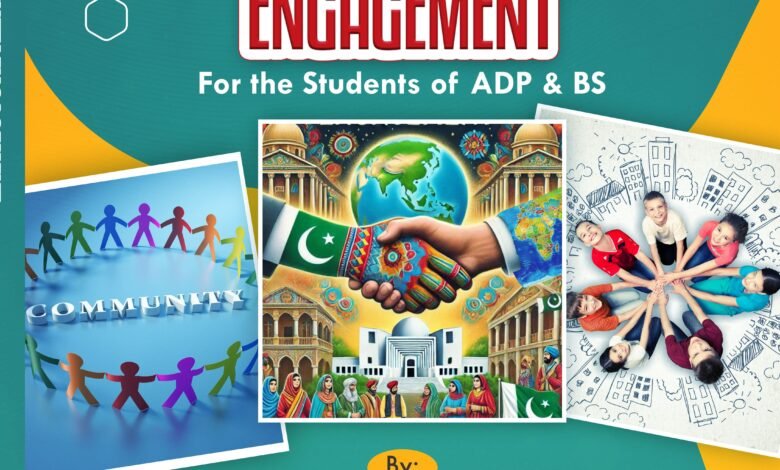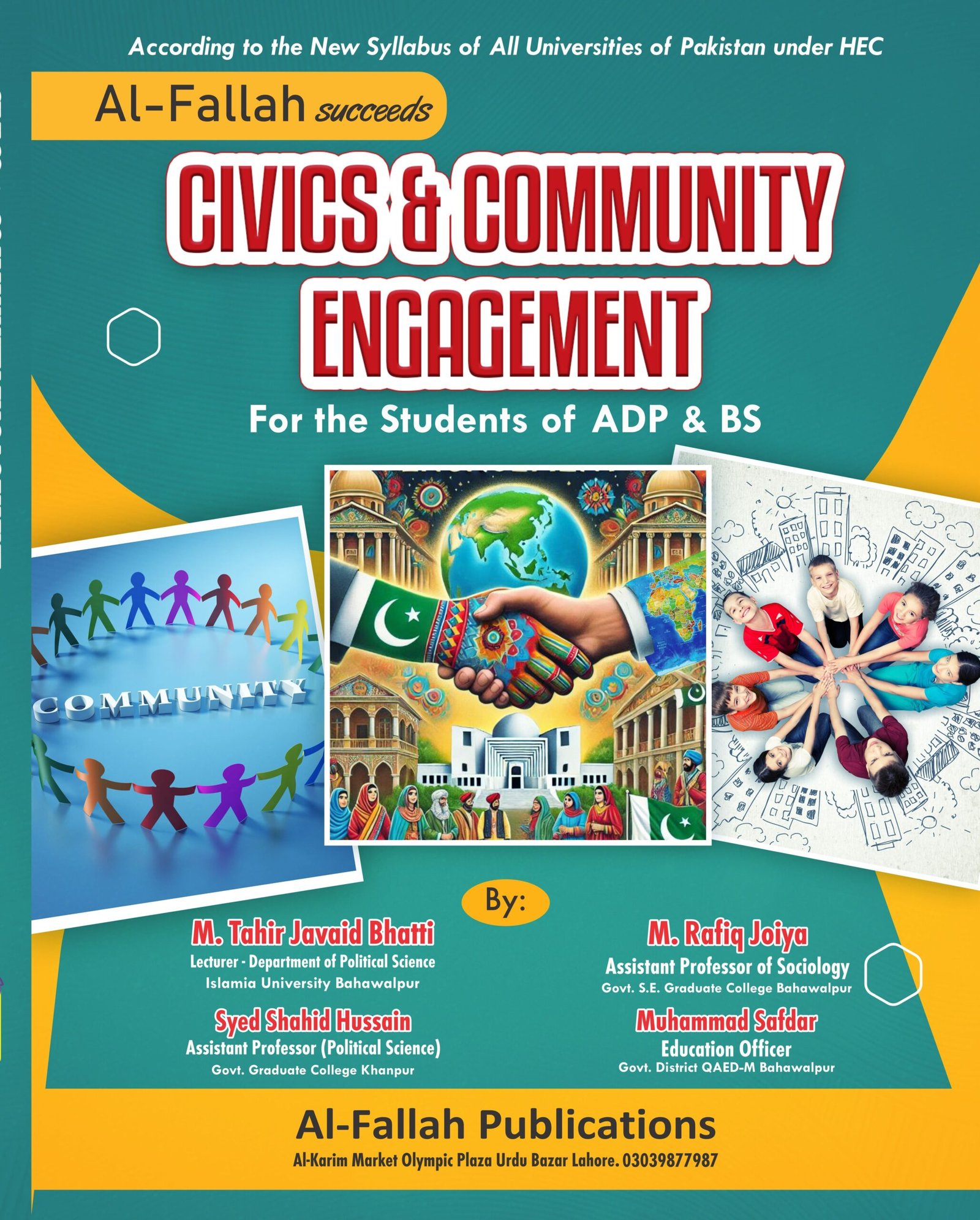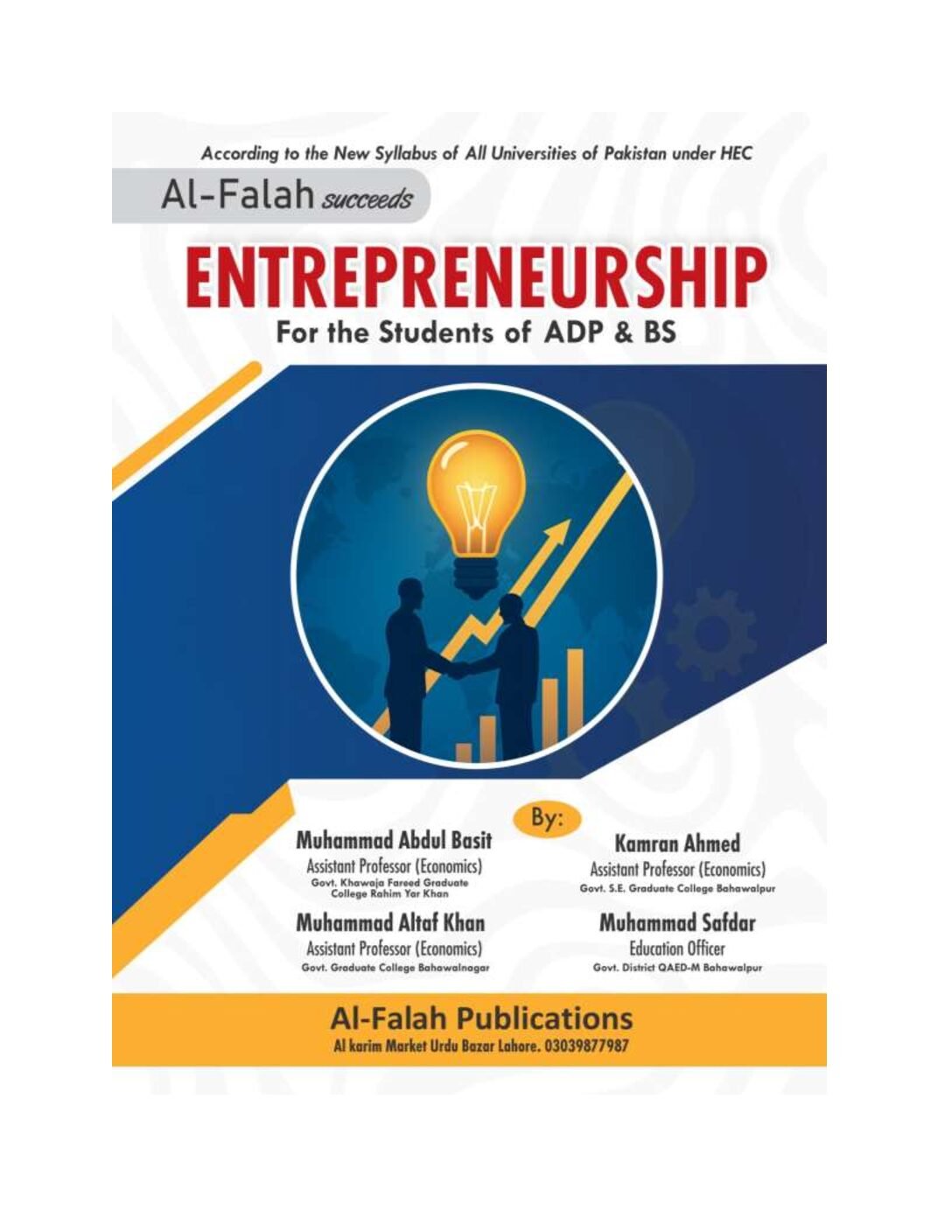CIVICS & COMMUNITY ENGAGEMENT – (اردو ترجمہ کے ساتھ)
Introduction to civics and citizenship, Structure and Functions of Government in Pakistan, Civic Responsibilities and Duties, Ethical Considerations in Civic Engagement(Accountability, Non-Violence, Peaceful Dialogue, Civility, etc.) have been described in full detail.


In this book, introduction to civics and citizenship, Structure and Functions of Government in Pakistan, Civic Responsibilities and Duties, Ethical Considerations in Civic Engagement (Accountability, Non-Violence, Peaceful Dialogue, Civility, etc.) Social Media etc have been described in detail. https://www.entertostudy.com/create-an-inclusive-stem-learning-environment/This book is for the students of ADP and BS of all universities working under jurisdiction of HEC.
TABLE OF CONTENTS
| Sr. # | UNIT NUMBER & CONTENTS | Page # | |
| 1 | 1. INTRODUCTION TO CIVICS AND CITIZENSHIP | ||
| 1.1 Definition of Civics, Citizenship and Civic Engagement | 1 | ||
| 1.2 Historical Evolution of Civic Participation | 7 | ||
| 1.3 Types of Citizenship: Active, Participatory, Digital, etc. | 12 | ||
| 1.4 The Relationship Between Democracy and Citizensgip | 29 | ||
| 2 | 2. CIVICS AND CITIZENSHIP | ||
| 2.1 Concepts of Civics, Citizenship and Civic Engagement | 34 | ||
| 2.2 Foundations of Modern Society and Citizenship | 63 | ||
| 3 | 3. STATE, GOVERNMENT AND CIVIL SOCIETY | ||
| 3.1 Structure and Functions of Government in Pakistan | 70 | ||
| 3.2 The Relationship Between Democracy and Civil Society | 90 | ||
| 3.3 Right to Vote and Importance of Political Participation | 93 | ||
| 4 | 4. RIGHTS AND RESPONSIBILITIES | ||
| 4.1 Overview of Fundamental Rights and Liberties of Citizens Under Constitution of Pakistan | 95 | ||
| 4.2 Civic Responsibilities and Duties | 104 | ||
| 4.3 Ethical Considerations in Civic Engagement(Accountability, Non-Violence, Peaceful Dialogue, Civility, etc.) | 119 | ||
| 5 | 5. COMMUNITY ENGAGEMENT | ||
| 5.1 Concept, Nature and Characteristics of Community | 139 | ||
| 5.2 Community Development and Social Cohesion | 154 | ||
| 5.3 Approaches to Effective Community Engagement | 168 | ||
| 5.4 Case Studies of Successful Community driven Initiatives | 171 | ||
| 6 | 6. ADVOCACY AND ACTIVISM | ||
| 6.1 Public Discourse and Public Opinion | 182 | ||
| 6.2 Role of Advocacy in Addressing Social Issues | 196 | ||
| 6.3 Social Action Movements | 198 | ||
| 7 | 7. DIGITAL CITIZENSHIP AND TECHNOLOGY | ||
| 7.1 The Use of Digital Platforms for Civic Engagement | 211 | ||
| 7.2 Cyber Ethics and Responsible Use of Social Media | 215 | ||
| 7.3 Digital Divides and Disparities (Access, Usage, Geographic, Socioeconomic, etc.,) and Their Impacts on Citizenship | 221 | ||
| 8 | 8. DIVERSITY, INCLUSION AND SOCIAL JUSTICE | ||
| 8.1 Understanding Diversity in Society (Ethnic, Cultural, Political) | 229 | ||
| 8.2 Youth, Women and Minorities’ Engagement in Social Dev. | 240 | ||
| 8.3 Addressing Social Inequalities and Injustices in Pakistan | 253 | ||
| 8.4 Promoting Inclusive Citizenship and Equal Rights for Societal Harmony and Peaceful Co-Existence | 264 | ||
| 9 | Model Question Papers | 274 | |
1.1 DEFINITION OF CIVICS
The word “civics“ originates from the Latin word “civicus”, which means “relating to a citizen” or “pertaining to citizenship”. It is derived from “civis“, meaning “citizen“. Simply, civics is the study of the roles, responsibilities, rights and duties of the citizens of a society. In the field of political science, civics is the study of the civil and political rights and responsibilities of citizens in a society. It covers topics such as the history of democracy, how laws are made, and how citizens can participate in their government. Civics teaches the people how to be active participants in their community and country.
“civis” سِوِکس” کا لفظ لاطینی زبان کے لفظ
سے آیا ہے، جس کا مطلب ہے “شہری سے متعلق” یا “شہریت سے متعلق”۔ یہ لفظ “سوکس” سے نکلا ہے جس کا مطلب ہے “شہری”۔ سادہ الفاظ میں سوکس معاشرے کے شہریوں کے کردار، ذمہ داریوں، حقوق اور فرائض کا مطالعہ ہے۔ سیاست کے میدان میں، شہریات معاشرے میں شہریوں کے شہری اور سیاسی حقوق اور ذمہ داریوں کا مطالعہ ہے۔ اس میں جمہوریت کی تاریخ، قوانین کیسے بنائے جاتے ہیں، اور شہری اپنی حکومت میں کیسے حصہ لے سکتے ہیں جیسے موضوعات کا احاطہ کرتا ہے۔ شہریت لوگوں کو سکھاتی ہے کہ کس طرح اپنی برادری اور ملک میں فعال حصہ دار بننا ہے ۔
Definitions of Civics by Famous Scholars
Here are some notable definitions of Civics by famous scholars:
- John Dewey viewed civics as:
“Civics is the study of the ways in which citizens can organize to achieve common ends and to resolve conflicts, emphasizing the need for active participation in a democracy.”
- Thomas Marshall says:
“Civics encompasses the rights, responsibilities, and roles of individuals within a political community and focuses on how these aspects contribute to the functioning of a democratic society.”
- According to Aristotle (in the context of civic philosophy):
“Civic education involves the study of the political and ethical responsibilities of the individual as a member of the state.”
- Lyman Bryson considered civics as:
“Civics is the social science that deals with the rights and duties of citizenship and the study of the principles of government.”
- Harold D. Lasswell emphasizes civics as:
“Civics is the study of who gets what, when, and how in the political and social framework of society, emphasizing power dynamics and governance.”
- In the view of James T. Shotwell:
“Civics is concerned with the relationship between the individual and the state, aiming to educate individuals about their responsibilities as members of a political community.”
- According to Sidney Hook:
“Civics seeks to foster a critical understanding of democratic principles and the practical means by which individuals can contribute to social and political progress.”
- R. Ambedkar views civics as:
“Civics is not merely about the knowledge of rights and duties but is also about understanding the essence of equality, liberty, and fraternity, which are the bedrock of democracy.”
- Plato opines in his discussions on civic education:
“Civic education is the process by which citizens are taught the values and skills necessary to contribute to the well-being and governance of the state.”
- Charles A. Beard said:
“Civics is the organized knowledge of the rights and obligations of citizens and the workings of the governmental system under which they live.”
- Frederick James Gould (December 1855-1938) defines civics as:
“Civics is the study of institutions, habits and spirits by means of which a man or woman (citizens) may fulfill the duties and receive the benefits of membership in political community”.
Simply, each of these definitions highlights the different aspects of civics, from theoretical concepts like democracy and rights to practical aspects of participation and governance.
مشہور اسکالرز کی نظر میں سِوِکس کی تعریف: یہاں سِوِکس کی کچھ اہم تعریفیں دی جا رہی ہیں جو مختلف اسکالرز نے پیش کی ہیں:
جان ڈیوی“:سِوِکس شہریوں کے مشترکہ مقاصد کو حاصل کرنے اور تنازعات کو حل کرنے کے طریقوں کا مطالعہ ہے، جو جمہوریت میں فعال شرکت کی ضرورت پر زور دیتا ہے۔“
تھامس مارشل“:سِوِکس انفرادی حقوق، ذمہ داریوں اور کرداروں کو سیاسی کمیونٹی میں شامل کرتا ہے اور یہ دیکھتا ہے کہ یہ پہلو جمہوری معاشرہ کی فعالیت میں کس طرح مدد دیتے ہیں۔“
ارسطو (شہری فلسفے کے تناظر میں“:شہری تعلیم وہ عمل ہے جس میں فرد کی سیاسی اور اخلاقی ذمہ داریوں کا مطالعہ کیا جاتا ہے جیسا کہ وہ ریاست کے رکن ہیں۔“
لائمین برائسن: “سِوِکس ایک سماجی سائنس ہے جو شہریت کے حقوق اور فرائض اور حکومت کے اصولوں کا مطالعہ کرتی ہے۔“
ہیروڈ ڈی. لاسویل“:سِوِکس وہ مطالعہ ہے جو معاشرتی اور سیاسی ڈھانچے میں کس کو کیا، کہاں اور کس طرح ملتا ہے پر زور دیتا ہے، طاقت کے تعلقات اور حکمرانی کو اہمیت دیتا ہے۔“
جیمز ٹی. شاٹ ویل“:سِوِکس فرد اور ریاست کے درمیان تعلقات سے متعلق ہے، جس کا مقصد افراد کو سیاسی کمیونٹی کے ارکان کی حیثیت سے ان کی ذمہ داریوں کے بارے میں آگاہ کرنا ہے۔“
سڈنی ہوک“:سِوِکس جمہوری اصولوں کی تنقیدی سمجھ بوجھ پیدا کرنے اور عملی طریقوں کی تلاش کرتا ہے جن کے ذریعے افراد سماجی اور سیاسی ترقی میں حصہ لے سکتے ہیں۔“
بی آر امبیڈکر“:سِوِکس صرف حقوق اور فرائض کے علم کا معاملہ نہیں ہے بلکہ مساوات، آزادی اور بھائی چارے کی حقیقت کو سمجھنے کے بارے میں ہے، جو جمہوریت کی بنیاد ہیں۔“
افلاطون (شہری تعلیم پر اپنی بحثوں میں”شہری تعلیم وہ عمل ہے جس کے ذریعے شہریوں کو ریاست کی فلاح و بہبود اور حکمرانی میں حصہ ڈالنے کے لئے ضروری اقدار اور مہارتیں سکھائی جاتی ہیں۔“
چارلس اے. بیرڈ “:سِوِکس وہ منظم علم ہے جو شہریوں کے حقوق اور ذمہ داریوں اور ان کے رہنے والے حکومتی نظام کے کام کاج کا مطالعہ کرتا ہے۔“
فریڈرک جیمز گولڈ (دسمبر 1855-1938“: (سِوِکس اداروں، عادات اور روحوں کا مطالعہ ہے جن کے ذریعے ایک مرد یا عورت (شہری) سیاسی کمیونٹی میں رکنیت کے فرائض کو پورا کرتا ہے اور فوائد حاصل کرتا ہے۔“
مختصر،ان تعریفوں میں سے ہر ایک سِوِکس کے مختلف پہلوؤں کو اجاگر کرتی ہے، جو جمہوریت اور حقوق جیسے نظریاتی تصورات سے لے کر شرکت اور حکمرانی کے عملی پہلوؤں تک پھیلی ہوئی ہیں۔











